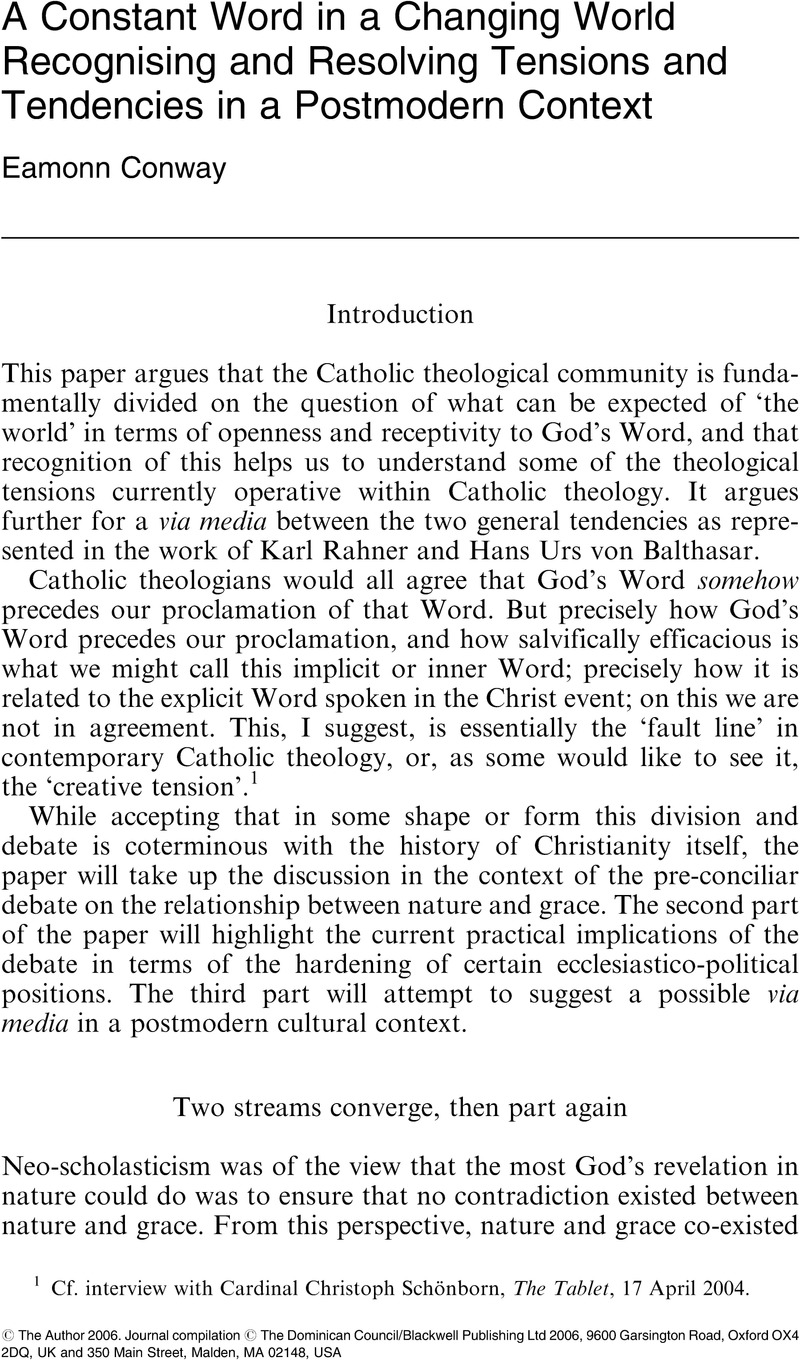No CrossRef data available.
Article contents
A Constant Word in a Changing World, Recognising and Resolving Tensions and Tendencies in a Postmodern Context
Published online by Cambridge University Press: 01 January 2024
Abstract

- Type
- Original Articles
- Information
- Copyright
- © The Author 2006. Journal compilation © The Dominican Council/Blackwell Publishing Ltd 2006, 9600 Garsington Road, Oxford OX4 2DQ, UK and 350 Main Street, Malden, MA 02148, USA
References
1 Cf. interview with Cardinal Christoph Schönborn, The Tablet, 17 April 2004.
2 Cf. Karl Rahner, ‘Concerning the Relationship between Nature and Grace’, Theological Investigations I, Darton, Longman & Todd, London, 1974, p. 298.
3 Cf. Coffey, David, ‘The whole Rahner on the Supernatural Existential’, Theological Studies, Vol 65 No.1, March 2004, pp. 73–94CrossRefGoogle Scholar. This is an excellent and lucid introduction of the development and centrality of this key concept in Rahner's theology.
4 Cf. Macquarrie, John, ‘The Anthropological Approach to Theology’, The Heythrop Journal, Vol XXV, 3, 1984, p. 282Google Scholar. The reference is to an important exchange between Rahner and Macquarie a few weeks before Rahner's death during which Macquarrie aligns himself with Rahner in stating that ‘I have always believed in what I might call a common grace: that creation itself brings with it a grace of creation; that as well as the specific Christian grace given in Jesus Christ there is a grace that is available to all human beings.
5 Ratzinger, Joseph, ‘Vom Verstehen des Glaubens. Anmerkungen zu Rahners Grundkurs des Glaubens’, Theologische Revuue, 74, 1978, p. 184Google Scholar. See also an interview with Cardinal Ratzinger http://www.stephanscom.at/suche/articles/2004/03/31/a5251, 31.3.2004 in which he stresses Rahner's faith and loyalty to the Church and to the Jesuits, and says that Rahner was no heretic.
6 Cf. Rulands, Batlogg, et al., Der Denkweg Karl Rahners. Quellen – Entwicklungen – Perspektiven, Matthias Grünewald Verlag, Mainz, 2003, p. 114Google Scholar.
7 Cited in Batlogg, Rulands et al., Op. Cit., p. 116.
8 Cited in Batlogg, Rulands et al., Op. Cit., p. 140.
9 Cf. Mongrain, Kevin, The Systematic Thought of Hans Urs von Balthasar, Crossroads, New York, 2002, p. 56Google Scholar.
10 ‘Current Trends in Catholic Theology and the Responsibility of the Christian’, Communio 5, Spring 1978, p. 80Google Scholar.
11 Balthasar, Hans Urs von, Theodramatik III, Handlung, Johannes Verlag, Einsiedeln, 1980, pp. 411–412Google Scholar.
12 Hans Urs von Balthasar, Theodramatik IV, Das Endspiel, Johannes Verlag, Einsiedeln, 1983, p. 273ff.
13 Joseph Ratzinger, homily in the Church of St Peter in the Vatican at the beginning of the conclave 18 April 2005. Cf. interview with Christoph Schöborn, The Tablet, 17 April 2005: ‘What Balthasar opposed to Rahner was the drama of salvation: it has cost the life of God's son. It's a costly grace. You cannot move from man to God without the narrow door of the cross – that was Balthasar's insistence.’
14 A phrase used by Professor Jim Corkery SJ in The Irish Times, 26 April 2005.
15 Cf. Karl Rahner, ‘Approaches to Theological Thinking’ in Karl Rahner in Dialogue 1965–1982, Inhofe & Balloons (eds), Crossroads, New York, 1986, p. 127: ‘You can conceive of the world and its history as if gracious and saving interventions of God continually descend on it from above, or you can think of it in such a way that the self-communicating God is its innermost heart.’
16 ‘The God who is Logos guarantees the intelligibility of the world, the intelligibility of our existence, reason's accord with God, and God's accord with reason, even though his understanding infinitely surpasses ours and to us may so often appear to be darkness.’ Ratzinger, Joseph, ‘Introduction to Christianity: Yesterday, Today and Tomorrow’, Communio 31, Fall 2004.Google Scholar
17 Cf. Ratzinger, Joseph, ‘Communio: A Program’, Communio 19, Fall 1992Google Scholar.
18 Cf. Zulehner, Paul, Sie gehen und werden nicht mann (Jes 40.31)– Priester in heutiger Kultur, Schwabenverlag, Ostfildern, 2001Google Scholar.
19 Cf. Komonchak, Joseph, ‘The Church in Crisis: Pope Benedict's Theological vision’, Commonweal, Vol CXXXII, No.11 (3 June 2005)Google Scholar.
20 Rahner, Karl, Encounters with Silence, Burns & Oates, London, 1960, p. 30Google Scholar.
21 Balthasar, Hans Urs von, Dare We Hope ‘That All Men Be Saved’?, Ignatius Press, San Francisco, 1988Google Scholar.
22 See Godzieba, Anthony, ‘Incarnation, Theory amd Catholic Bodies’, Louvain Studies, Vol 28, No.3, Fall 2003, p. 218Google Scholar.
23 Balthasar, Hans Urs von, ‘Geist und Feuer’, Herder Korrespondenz 30, 1976, p. 78Google Scholar.
24 Joseph Ratzinger, ‘Communio: A Program’.
25 Boeve, Lieven, ‘(Post)Modern Theology on Trial? Towards a Radical Theological Hermeneutics of Christian Particularity’, Louvain Studies 28, Vol 3, Fall 2003, pp. 240–254CrossRefGoogle Scholar; Boeve, Lieven, Interrupting Tradition, Louvain Theological and Pastoral Monographs, 30, Peters/Eerdmans, Leuven/Grand Rapids, 2003.Google Scholar
26 Godzieba, Op. Cit., p. 220.
27 Lumen Gentium, n.48.




